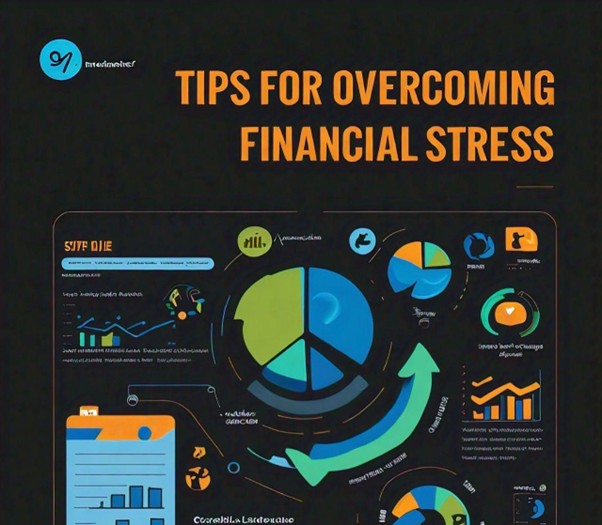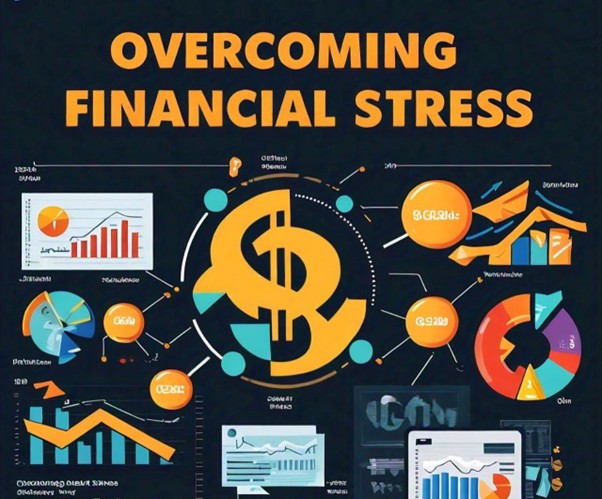REVOLUTIONARY APPROACH TO OVERCOMING FINANCIAL STRESS: TIPS FOR PEACE OF MIND AND 10 TIPS FOR OVERCOMING FINANCIAL STRESS
Are you tired of feeling overwhelmed by financial worries? Do you dream of achieving financial peace of mind? You’re not alone. Financial stress affects millions of people worldwide, causing anxiety, depression, and even physical health problems.
as a Canada tax expert and financial advisor in Ontario, I’ve seen first-hand the devastating impact of financial stress on individuals and families. But I’ve also witnessed the transformative power of financial planning and management.
In this comprehensive guide, we’ll explore the causes of financial stress, its effects on mental and physical health, and most importantly, provide practical tips and strategies for overcoming financial stress and achieving peace of mind.
UNDERSTANDING FINANCIAL STRESS

Financial stress is a state of emotional and psychological distress caused by financial difficulties, uncertainties, or fears. It can manifest in various ways, including:
– Anxiety and worry about paying bills or debts
– Fear of financial insecurity or instability
– Difficulty sleeping or concentrating due to financial concerns
– Avoidance of financial discussions or decisions
– Feelings of guilt, shame, or inadequacy related to financial situation
Financial stress can be caused by various factors, including:
– Debt or financial obligations
– Unstable or insufficient income
– Medical expenses or health issues
– Divorce or separation
– Major life changes, such as having a child or buying a home
THE EFFECTS OF FINANCIAL STRESS
Financial stress can have far-reaching consequences on both mental and physical health. Some common effects of financial stress include:
– Anxiety and depression
– Insomnia and sleep disorders
– Digestive problems and stomach issues
– Weakened immune system
– Increased blood pressure and cardiovascular disease
– Strained relationships and social isolation
TIPS FOR OVERCOMING FINANCIAL STRESS

Fortunately, there are many strategies and techniques that can help you overcome financial stress and achieve peace of mind. Here are some practical tips to get you started:
1. Create A Budget: Start by tracking your income and expenses to understand where your money is going. Make a budget that accounts for all your necessary expenses, savings, and debt payments.
2. Prioritize Needs Over Wants: Be honest with yourself about what you need versus what you want. Prioritize essential expenses like rent/mortgage, utilities, and food over discretionary expenses like dining out or entertainment.
3. Pay Off High-interest Debt: Focus on paying off high-interest debt, such as credit card balances, as soon as possible. Consider consolidating debt into a lower-interest loan or balance transfer credit card.
4. Build An Emergency Fund: Aim to save 3-6 months’ worth of living expenses in an easily accessible savings account. This fund will help you weather financial storms and avoid going into debt.
5. Invest In Yourself: Invest in your education, skills, and personal development to increase your earning potential and financial stability.
6. Seek Support: Don’t be afraid to seek help from a financial advisor, therapist, or support group. Sharing your financial concerns with others can help you feel less isolated and more empowered to take control.
7. Practice self-care: Take care of your physical and emotional well-being by getting enough sleep, exercising regularly, and engaging in stress-reducing activities like meditation or yoga.
8. Avoid Lifestyle Inflation: As your income increases, avoid the temptation to inflate your lifestyle by spending more on luxuries. Instead, direct excess funds towards savings, debt repayment, and investments.
9. Stay Informed But Avoid Obsession: Stay informed about personal finance and economic trends, but avoid obsessing over financial news or social media. This can help reduce anxiety and prevent impulsive financial decisions.
10. Celebrate Milestones: Celebrate your financial milestones, no matter how small they may seem. This will help you stay motivated and encouraged throughout your financial journey.
ADDITIONAL STRATEGIES FOR ACHIEVING PEACE OF MIND

In addition to the tips above, consider the following strategies for achieving peace of mind:
1. Mindfulness and meditation: Regular mindfulness and meditation practice can help reduce stress and anxiety, improve focus, and increase feelings of calm and well-being.
2. Gratitude practice: Reflect on the things you’re grateful for each day, no matter how small they may seem. This can help shift your focus away from financial worries and cultivate a more positive mind set.
3. Connect with nature: Spend time in nature, whether it’s walking in a park, hiking in the woods, or simply sitting in a garden or on a balcony with plants. Nature can have a calming effect and help reduce stress.
4. Creative expression: Engage in creative activities that bring you joy, whether it’s painting, drawing, writing, photography, or playing music. Creative expression can help distract from financial worries and provide an outlet for emotions.
5. Social connections: Nurture your relationships with friends and family, and make an effort.
FREQUENTLY ASKED QUESTIONS
General Questions
- What is financial stress, and how does it affect my life?
Financial stress is a state of emotional and psychological distress caused by financial difficulties, uncertainties, or fears. It can affect your relationships, work performance, physical health, and overall well-being.
2. How common is financial stress, and am I alone in experiencing it?
Financial stress is a common problem affecting millions of people worldwide. You are not alone in experiencing financial stress, and seeking help is a sign of strength, not weakness.
3. Can financial stress affect my mental health?
Yes, financial stress can have a significant impact on your mental health, increasing the risk of anxiety, depression, and other mental health problems.
Budgeting and Financial Planning
- How do I create a budget that works for me?
Start by tracking your income and expenses to understand where your money is going. Make a budget that accounts for all your necessary expenses, savings, and debt payments.
2 What are some common budgeting mistakes to avoid?
Common budgeting mistakes include not accounting for irregular expenses, not prioritizing needs over wants, and not regularly reviewing and adjusting your budget.
3. How do I prioritize my expenses and make financial decisions?
Prioritize your expenses by focusing on essential needs like housing, food, and utilities. Make financial decisions based on your long-term goals and values.
Debt and Credit Management
- How do I manage my debt and avoid overspending?
Create a debt repayment plan, prioritize high-interest debt, and avoid new credit inquiries. Use the 50/30/20 rule to allocate your income towards necessary expenses, discretionary spending, and savings.
2. What are some strategies for paying off high-interest debt?
Consider debt consolidation, balance transfer credit cards, or debt snowball/avalanche methods. Always prioritize high-interest debt and focus on paying more than the minimum payment.
3. How do I improve my credit score and maintain good credit habits?
Make on-time payments, keep credit utilization low, monitor your credit report, and avoid new credit inquiries. Aim to maintain a credit utilization ratio below 30%.
Investing and Retirement Planning
- How do I get started with investing and growing my wealth?
Start by setting clear financial goals, understanding your risk tolerance, and diversifying your investments. Consider consulting a financial advisor.
2. What are some common investing mistakes to avoid?
Common investing mistakes include not diversifying your portfolio, not having a long-term perspective, and not regularly reviewing and adjusting your investments.
3. How do I plan for retirement and ensure a secure financial future?
Start by setting clear retirement goals, understanding your retirement options, and creating a retirement plan. Consider consulting a financial advisor and taking advantage of tax-advantaged retirement accounts.
Mindfulness and Stress Management
- How can mindfulness and meditation help me manage financial stress?
Mindfulness and meditation can help reduce stress and anxiety, improve focus, and increase feelings of calm and well-being. Regular practice can also improve financial decision-making.
2. What are some stress management techniques for coping with financial stress?
Stress management techniques include deep breathing, exercise, journaling, and seeking social support. Prioritize self-care and make time for activities that bring you joy and relaxation.
Seeking Professional Help
- How do I know if I need professional help with my finances?
If you’re struggling to manage debt, create a budget, or make financial decisions, consider seeking professional help from a financial advisor or credit counsellor.
2. What are the benefits of working with a financial advisor?
Working with a financial advisor can provide personalized guidance, help you create a tailored financial plan, and give you peace of mind knowing you’re making informed financial decisions.
CALL TO ACTION
Book a consultation with our team of financial experts to relief yourself of financial stress and receive personalized advice. Don’t let financial stress hold you back from having peace of mind financially. Contact us at [email protected] to schedule your appointment.
ABOUT AUTHOR
Shanel John is a dedicated Certified Public Accountant (CPA) at G.L.H. Accounting, specializing in Income Tax with 10 years of experience. Based in Brampton, Ontario, Canada, Shanel offers expertise in tax preparation, financial accounting, and advisory services. A certified QBO Pro Advisor, Shanel’s decade-long experience and knowledge make her a trusted figure in the accounting field.
ADDITIONAL RESOURCES
- Financial Literacy page: https://www.canada.ca/en/financial-consumer-agency/programs/financial-literacy.html
- Financial Consumer Agency of Canada: https://www.canada.ca/en/financial-consumer-agency.html
- Consumer Financial Protection Bureau (CFPB): https://www.consumerfinance.gov/
- Canada’s Financial Consumer Agency (FCAC): https://www.canada.ca/en/financial-consumer-agency.html
By addressing these frequently asked questions, you’ll be better equipped to overcome financial stress and achieve peace of mind. Remember, taking control of your finances is a journey, and seeking help is a sign of strength, not weakness.

